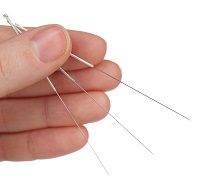Article
Should Nervous Athletes Opt for the Needle?
Author(s):
Anxiety can impact anyone, but athletes in pressure situations represent a heightened potential for nervousness to impact performance. An upcoming clinical trial in China will test the effectiveness of wrist-ankle acupuncture in treating precompetition nervous syndrome.

Anxiety can impact anyone, but athletes in pressure situations represent a heightened potential for nervousness to impact performance. According to a paper in Trials, an upcoming clinical trial in China will test the effectiveness of wrist-ankle acupuncture (WAA) in treating precompetition nervous syndrome.
Sure, all athletes in competition face some pre-performance jitters, but precompetition nervous syndrome is an excessive anxiety response that can significantly impact performance. Strategies for dealing with it currently include mediation, deep breathing exercises, hypnosis, and even cognitive behavioral therapy (CBT), although hard clinical evidence showing long-term effectiveness for any of those techniques is scant at best.
The use of acupuncture worldwide for conditions ranging from anxiety to insomnia to depression continues to grow. The researchers behind the current trial have worked with WAA for pre-examination anxiety, and found it to be effective in alleviating stress associated with the mental task of taking tests. But athletic endeavors are obviously physical in nature. And unlike, say, CBT, acupuncture involves insertion of needles that many find unpleasant. Thus, it has rarely been tried as a method for enhancing performance by removing anxiety and hesitation that can be associated with nervousness.
The trial will be a single-blind, randomized control trial that will test WAA in 100 participants versus a sham acupuncture procedure. The trial will be conducted in annual track and field events of Shanghai University of Sport. The Competition State Anxiety Scale (CSAI-2) will be used as the primary outcome measure, while heart rate, blood pressure, respiratory frequency, tension syndrome curative effect evaluation and participants’ feeling of acupuncture questionnaire will be secondary outcome measures.
According to the study authors, “The theory of WAA has a unique system of its own, which is quite different from that of traditional acupuncture. WAA does not produce the ‘needling sensation’ and has demonstrated good effects for mental and nervous disorders. More importantly, the lack of pain and ‘needling sensation’ during the performance of WAA imposes minimal psychological stress on the player and hence is readily accepted.”
One interesting aspect of the study is that participants will not know whether they are receiving WAA or sham acupuncture, because they will be wearing an eye mask while receiving the treatment. “Under this condition, [participants will] not know which intervention they would be given and also could not distinguish therapeutic intervention in the subsequent treatment. The participants’ feeling of acupuncture questionnaire would be arranged at the end of treatment in order to exclude the breaking of blinded subjects. Therefore, we believe that this method can serve as an effective placebo intervention and that this study will be able to provide high-quality evidence for the efficacy of WAA for precompetition nervous syndrome.”
The participants will be asked to complete two identical scale questionnaires and physical condition examinations before and after the treatment in order to assess their anxiety levels. The first questionnaire and physical condition examination must be completed 30 minutes before the treatment, while the second one will be collected 30 minutes after the treatment.





